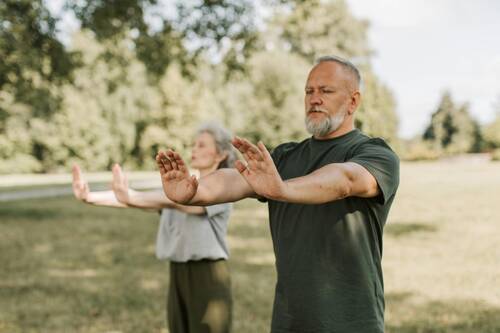
21 Jan Veterans’ Study Finds Qigong Helpful in Reducing Chronic Low Back Pain and Pain-Related Disability
MedicalResearch.com Interview with:

Dr. Cheryl Krause-Parello
Cheryl A. Krause-Parello, PhD, RN, FAAN
Associate Vice President for Research
Associate Executive Director & Faculty Fellow
Institute for Human Health and Disease Intervention (I-HEALTH)
Director, C-P.A.W.W. Canines Providing Assistance to Wounded Warriors® Health Research Initiative for Veterans
Professor (Secondary), Christine E. Lynn College of Nursing
Florida Atlantic University
MedicalResearch.com: What is the background for this study?
Response: Chronic pain, especially chronic low back pain, is a significant issue for U.S. military veterans, affecting 40–70% of this population and often leading to disability. Veterans experience higher rates of chronic pain than civilians, with back pain being the most prevalent type. Younger veterans and those from recent conflicts report more severe pain, while older veterans frequently face persistent chronic pain. Complicating factors include comorbid conditions such as PTSD, traumatic brain injury, and behavioral disorders, as well as an increased reliance on opioids, which pose risks of addiction and overdose. This underscores the need for nonpharmacological interventions like qigong, a traditional Chinese practice combining movement, breathing, and meditation, to address the biopsychosocial challenges of chronic low back pain.
MedicalResearch.com: What are the main findings?
Response: The main findings from the study:
- Pain Relief: Veterans who participated in an eight-week qigong intervention reported significant reductions in pain intensity, pain-related disability, and pain interference compared to the control group.
- Improved Sleep: Sleep disturbances improved significantly among veterans in the qigong group.
- Inflammation and Psychosocial Outcomes: Biological markers of inflammation, such as TNF and IL-8, were strongly associated with physical and mental health outcomes, including pain-related disability and PTSD symptoms.
- Holistic Benefits: Qigong’s gentle movements, stretching, and meditation improved physical conditions (e.g., flexibility, posture) and psychosocial aspects (e.g., depression, social isolation).
MedicalResearch.com: What should readers take away from your report?
Response: Qigong offers a safe, accessible, and effective nonpharmacological option for managing chronic low back pain in veterans. The practice holistically addresses pain, sleep disturbances, and psychosocial challenges without the risks associated with medication. Health care providers should consider integrating qigong into treatment plans for veterans to improve overall well-being.
MedicalResearch.com: What recommendations do you have for future research as a results of this study?
- Conduct a fully powered clinical trial to further explore the effectiveness of qigong for chronic low back pain in veterans.
- Investigate the specific mechanisms by which qigong reduces inflammation and its impact on physical and mental health outcomes.
- Assess the long-term benefits of qigong practice, including sustained pain relief and improved quality of life.
- Evaluate qigong’s efficacy in diverse veteran populations, including those with varying levels of pain severity or comorbid conditions.
MedicalResearch.com: Is there anything else you would like to add? Any disclosures?
Response: The study highlights the critical need for holistic, multidimensional approaches to addressing chronic pain, particularly among veterans who face complex physical, psychological, and social challenges. It emphasizes qigong as a compelling and evidence-based alternative to pharmacological treatments, offering a safe and accessible solution without the risks of addiction or side effects associated with medications. By integrating gentle movements, breathing exercises, and meditation, qigong not only alleviates physical pain but also improves mental health, sleep, and social well-being. This holistic practice represents a transformative approach that could significantly enhance the quality of life for veterans and others struggling with chronic low back pain.
I do not have any disclosures to report.
Citation: Krause-Parello CA, Park J, Newman D. Examining Preliminary Efficacy of a Qigong Intervention in Veterans with Chronic Low Back Pain: A Randomized Controlled Pilot Study. Pain Manag Nurs. 2024 Nov 22:S1524-9042(24)00275-3.
doi: 10.1016/j.pmn.2024.10.013. Epub ahead of print. PMID: 39580236.
————————-
The information on MedicalResearch.com is provided for educational purposes only, and is in no way intended to diagnose, cure, or treat any medical or other condition.
Some links may be sponsored. Products are not warranted or endorsed.
Always seek the advice of your physician or other qualified health and ask your doctor any questions you may have regarding a medical condition. In addition to all other limitations and disclaimers in this agreement, service provider and its third party providers disclaim any liability or loss in connection with the content provided on this website.
—-
The information on MedicalResearch.com is provided for educational purposes only, and is in no way intended to diagnose, cure, or treat any medical or other condition.
Some links are sponsored. Products, included compounded prescriptions above are not warranted or endorsed.
Always seek the advice of your physician or other qualified health and ask your doctor any questions you may have regarding a medical condition. In addition to all other limitations and disclaimers in this agreement, service provider and its third party providers disclaim any liability or loss in connection with the content provided on this website.
Last Updated on January 21, 2025 by Marie Benz MD FAAD

